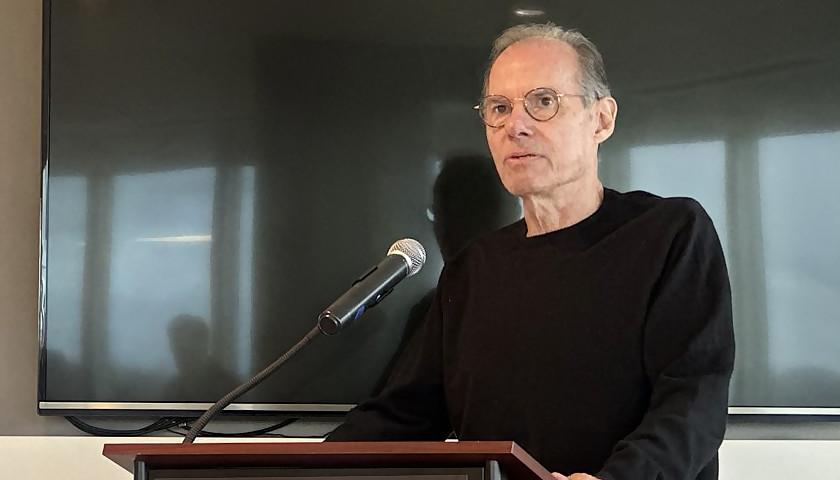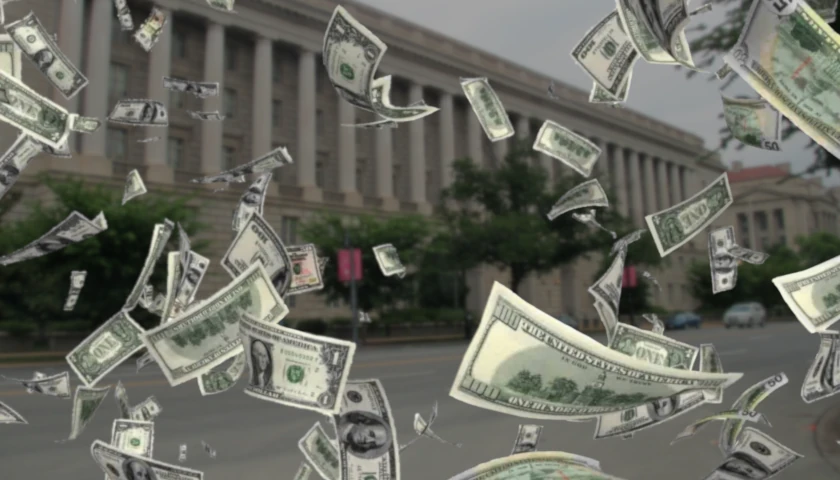by Roger Kimball
What a week it’s been! We started off with Justice Amy Souter Barrett writing the SCOTUS ruling in Murthy v. Missouri. At issue was whether it was okay for the federal government (the FBI and related elements of the American Stasi) to pressure social media and data-hoovering companies (Facebook, Twitter, Google, etc.) to suppress opinions they didn’t like about things like COVID, the 2020 election, and the Jan 6 jamboree at the Capitol.
Just to be clear about this: it is not okay for the government to do this, but that’s not what Justice Souter Barrett said. She did not quite come out and say it was okay. She left that bizarro opinion to her colleague Justice Ketanji Brown Jackson, who, during the oral argument phase of the case, said to plaintiff’s counsel: “My biggest concern is that your view has the First Amendment hamstringing the federal government in significant ways.”
Memo to Justice Jackson: “hamstringing the federal government,” i.e., limiting its prerogatives and ability to intrude upon the lives of its citizens, is the very point of the First Amendment. That’s why we have a First Amendment. Indeed, it is a large part of why we have a constitution: to protect citizens from the coercive power of the state.
Justice Barrett was not quite so forthright. She argued that the plaintiffs “lacked standing.” If Louisiana and Missouri lacked standing to defend their citizens in this case, who or what would have standing? That was part of the burden of Justice Alito’s robust dissent, in which he was joined by the other adults on the Court, Clarence Thomas and Neil Gorsuch. As the legal commentator Jonathan Turley put it, “The government is engaging in censorship by surrogate… They have made a mockery of the limits of the First Amendment.”
Justice Barrett was not done making those of us who supported her nomination to the Supreme Court regret our support. In Fischer v. United States, one of the most important cases before the Court this session, the issue was whether it was okay to use an Enron-era law that was designed to prohibit destroying evidence to go after January 6 defendants (and that ex officio perpetual defendant, Donald Trump). This was the famous, or infamous, “obstructing an official proceeding” charge that we heard so much about while the FBI was arresting grandmothers and other tourists who were in the Capitol that day, and which official but illegally appointed bag man Jack Smith has so handsomely availed himself of in his vendetta against Trump. The case was decided Friday, 6-3, but Barrett weighed in with a dissent. It turns out that Sen. Dianne Feinstein need not have worried: the dogma does not live loudly in Barrett after all.
It used to be that the FBI and other members of the law enforcement fraternity would discover a crime and then pursue the perpetrators. Now, as the dragnet sparked by the January 6 protest shows, “law enforcement” means identifying people the regime doesn’t like and then combing through the statute book to see what laws might apply, or be twisted to apply, to them. It’s a refreshed, Americanized version of the venerable principle articulated by Stalin’s head of the secret police, Lavrentiy Beria: “Show me the man,” said Beria, “and I will show you the crime.”
Another major case, also decided Friday, overturned the 1984 case Chevron v. Natural Resources Defense Council, which in effect handed legislative power to the alphabet soup of federal agencies. By striking down Chevron, the Court dealt an important blow to “the administrative state,” that parallel government populated by unelected, largely unaccountable bureaucrats who have increasingly been the ones who ran our lives: promulgated the rules by which we were required to live and imposed the fines and other sanctions should we fail to do so. Article One of the Constitution begins by vesting “All legislative Powers . . . in a Congress of the United States, which shall consist of a Senate and House of Representatives.” Chevron bypassed that stipulation by stealth, rendering Congress more and more ceremonial as distinct from a legislative body.
There’s one big case yet to be decided, and that’s on the question of presidential immunity from criminal prosecution. We’re told we will get that decision on Monday. What can we expect? No one outside the hallowed chambers knows. But most observers expect the Supremes to recognize immunity for “official acts” but to remand to the lower court the vexed question of what counts as an “official” and therefore protected act. Since the Court is in Washington and the judge is an anti-Trump fanatic, you can take it as meaning that she will not find for Donald Trump. But then his lawyers will appeal, and the case will almost certainly not be decided until after the election.
So it’s been a week crowded with incident. But, important to the future of the republic though some of those cases are, the most entertaining episode from last week was the CNN-sponsored debate in Atlanta on Thursday between Joe Biden and Donald Trump.
Debate? Well, advertisers do not speak under oath. It was billed as debate. And writing this gives me an opportunity to correct something I wrote elsewhere. With the sponsoring network being the anti-Trump organ CNN and the moderators being veteran anti-Trump reporters Jack Tapper and Dana Bash, I assumed that the whole proceeding would be a calculated Get-Trump fest. In the event, however, the moderators played it fair. They asked some hard questions of both candidates, but there were no Candy Crowley-Mitt Romney moments.
What there were plenty of were embarrassing moments from Joe Biden. He was as vacant as a large hotel in a deserted city. Many of his responses were incoherent. But worse was his affect. His open-mouthed, distant stare was like a scene from a dementia ward or horror film. Publications across the ideological spectrum said it was the worst performance in a presidential debate on record. The response everywhere was, “Oh my God this is a disaster.” One story reported that foreign diplomats reacted “with horror” to Biden’s performance. The Editorial Board of The New York Times spoke for many when it said, “To Serve His Country, President Biden Should Leave the Race.” Gavin Newsom, Gretchen Whitmer, Hillary Clinton, someone, anyone had to ride to the rescue and save the Democrats.
But within hours, Biden was like a dinghy that had been capsized but then righted. A new narrative, blessed by the party’s Godfather St. Barack, emerged. A post on X by Obama contained all the salient motifs. Yes, Joe’s performance was weak, but everyone has off nights. “Bad debate nights happen,” Obama said. “Trust me, I know.”
But this election is still a choice between someone who has fought for ordinary people his entire life and someone who only cares about himself. Between someone who tells the truth — who knows right from wrong and will give it to the American people straight — and someone who lies through his teeth for his own benefit.
The idea that Trump repeatedly lies has quickly become the go-to bludgeon for Biden die-hards. Immediately after the debate, Jill Biden — sorry, “Dr.” Jill Biden — gave a certifiably creepy performance when she publicly congratulated her husband as if he were a pet that had just performed a little trick or a toddler who had finished his bowl of oatmeal without crying. “Joe, you did such a great job answering every question. You knew all the facts.” She then proved that she had received the memo: “And what did Trump do? Lie!”
That has clearly become the meme of the moment: Trump lied. But did he? Not that I could see. He exaggerated, yes. He boasted, without doubt. And he opined about many things, stating, for example, that Joe Biden is the worst president in history. Is that a lie? Even if it isn’t true (though I believe it is true), stating that opinion is not to lie.
Once again, we see the Democrats resorting to their favorite rhetorical-psychological tactic: projection, that is, accusing others of the bad things you yourself do.
For example, Joe Biden said that he capped insulin at $15 a shot. That is not true. In fact, it is a lie. Nor is it true that he capped Medicare drug expenses at $200; the real figure is something like $2000. Biden resurrected the lie that while in France, Trump described US servicemen as “suckers and losers.” But he never did. Biden lied about that. He also lied when he accused Trump of saying that there were “fine people” among the White Supremacists in Charlottesville or that “Hitler had done good things.” Biden lied when he claimed that no soldiers had died since he had been president. He lied when he said that unemployment had been 15% under Trump, that Trump wanted to get rid of Social Security, that the border patrol union had endorsed him, and that border crossings were lower on his watch than under Trump. Indeed, Biden’s performance — those bits that were intelligible — was a tapestry of untruths and outright lies. (The Federalist just published a handy compilation of twenty of the most egregious of Biden’s lies.)
I hate to make political predictions because, in the past, I have often been wrong. Aftershocks continue to reverberate down the corridors of Democratic power. It is still possible that Biden will have to bow out. But the party elders seem resigned. As David Axelrod, Obama’s chief strategist, said, unless Biden himself decides to quit–“which he won’t”–the “issue is settled.” We’ll see. In any event, I suspect that this race, notwithstanding the Democrat efforts to get millions of illegal aliens to vote early and vote often, is going to end with a resounding victory for Trump. Maybe Judge Juan Merchan will put Donald Trump in jail come July 11. It won’t matter. The polls, most of them, still say the race is close. After this interesting week, I suspect that Trump will win in a landslide.
– – –
Roger Kimball is editor and publisher of The New Criterion and the president and publisher of Encounter Books. He is the author and editor of many books, including The Fortunes of Permanence: Culture and Anarchy in an Age of Amnesia (St. Augustine’s Press), The Rape of the Masters (Encounter), Lives of the Mind: The Use and Abuse of Intelligence from Hegel to Wodehouse (Ivan R. Dee), and Art’s Prospect: The Challenge of Tradition in an Age of Celebrity (Ivan R. Dee). Most recently, he edited and contributed to Where Next? Western Civilization at the Crossroads (Encounter) and contributed to Against the Great Reset: Eighteen Theses Contra the New World Order (Bombardier).








